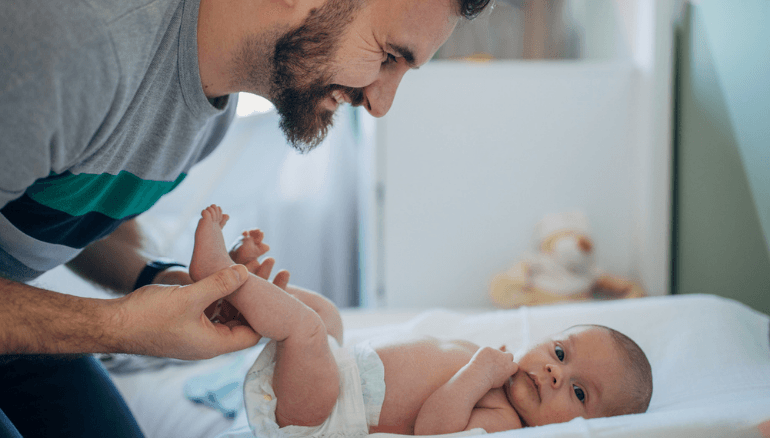When men take parental leave there are significant benefits for their kids, their partners and themselves. Children have stronger relationships with dads who take leave and better school performance[1], mums who have more support while recovering from childbirth experience less stress and dads’ involvement in childcare is linked to improved wellbeing, happiness and commitment to family[2].
However, figures from the Australian Bureau of Statistics show that just one in 20 fathers take primary parental leave (low by global standards) with 95% of all primary carers leave taken by mothers[3]. Secondary carers — most often dads — can take a fortnight of Dad and Partner pay at minimum wage as well as any leave their work offers, but only half of them are taking up the government scheme.
These statistics are unlikely to reflect a lack of interest in parental leave — three in four dads told the Human Rights Commission that they would have liked to take additional leave[4] — but highlight the range of social and economic roadblocks that prevent fathers from spending critical time with their newborns.
Income, workplace stigma, traditional gender norms, and a lack of nationally legislated ‘shared parental leave’ (meaning ‘secondary carers’ are left with limited time off if any at all) are some of these reasons.
We spoke to three men about their experiences navigating these barriers to take substantial parental leave and why they’d recommend more men do the same.

It’s a cliche, but you can’t buy back that time — Janan
Georgia, 4, and Ezra, 20 months.
We both knew we wanted to have kids and roughly how many as well. A couple of years after we got married we started trying. I’m a physiotherapist and I worked in community health at the time. I looked at our Enterprise Bargaining Agreement to see what we were allowed to take as parental leave, so I knew what my entitlements were.
Around midway through the pregnancy when we knew that things were stable, we started planning for parental leave. I knew another male colleague had taken parental leave before and we’d spoken about how it had been. I brought it up with my manager and work was supportive.
At the start, I took a month off, and for the rest of that first year, I took blocks of two weeks off.
I’m not someone that’s overly emotional, but I would say when my daughter Georgia was born, I shed a tear or two. That was special because just looking at something so unique was quite an emotional thing.
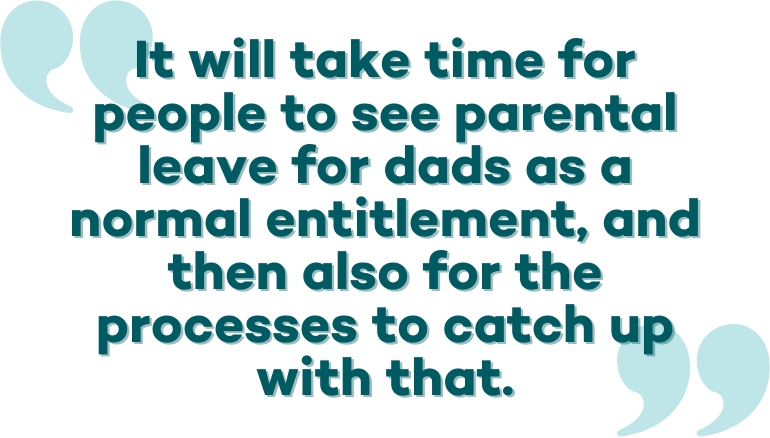
It’s a bit hard to know what to expect but I came to realise that every child is different and every parenting technique is different. The main thing I needed to get used to in the first few weeks was waking up at night when my child was crying and getting used to the routines around someone else — changing nappies, feeding, and all of that. I knew for my wife it was quite exhausting having to breastfeed as well, so during the nights after she fed the baby, I would put her to bed or I would rock her.
My son, Ezra, was born during the pandemic and that was quite a different experience, and we didn’t have the usual support. In the first few weeks I found that I was looking after Georgia a bit more while my wife was looking after Ezra. We had to be aware of giving both of them attention.
If more dads bring up parental leave at work, then it can be identified by more workplaces that there is a demand for it. It’s a cliche, but you can’t buy back that time. It will take time for people to see parental leave for dads as a normal entitlement, and then also for the processes to catch up with that.

I feel like I was a better dad and a better husband overall — Tom
Jelenka, 13, Kyntia, 12, Livius, 6.
I grew up in a house full of kids, so I always wanted to have children. It was something my wife and I talked about after a couple of years living together.
When we had our first child, Jelenka, I was running my mum’s business and I was barely able to take annual leave, let alone parental leave. Due to complications, my wife had to have a cesarean. That was on a Wednesday, and I was back at work by the next Monday. My second child, Kyntia, was born on a Tuesday and I got the rest of the week off.
It burnt the relationship I had with that boss.
I took the carer’s leave and then instead of having my 20 days of parental leave in one go, I worked two and a half days a week for another six weeks. I also built up some flex before the baby came, so I tapped into that.
Our eldest child was seven and our middle child five and a half which meant first year of school and kindergarten. That’s what I helped heavily with — doing the school pickups, feeding the kids, bathing the kids. But it was bonding. It did make for a better relationship with my kids, particularly my youngest.
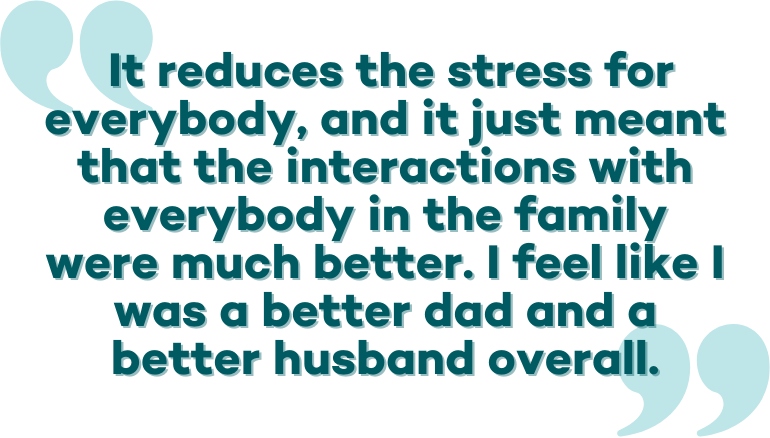
There’s nothing more amazing than spending time when your baby is really little and really getting to know and understand them. Because what I saw and the interactions that I had then, have set me up now. I know that my eldest two, they’re just as affectionate, because I’m really affectionate with them.
But my son is next level. He hangs off me and is prepared to come to me with what’s going on in his head before the eldest two would.
Getting to be there for a lot more of the random firsts, like smiling. I was also able to do a lot more, like holding the baby while we went grocery shopping, getting all the washing in and out, and those sorts of things. It reduces the stress for everybody, and it just meant that the interactions with everybody in the family were much better. I feel like I was a better dad and a better husband overall.
My relationship with my wife was stronger because, with our first two children, she was very stressed. I wasn’t there. I was working from four in the morning until five at night.
It would be useful for men to understand what’s involved with childbirth because the physical and psychological trauma to the mother is pretty intense. Just be involved. Go to the appointments, ask questions.
There also needs to be more support for parental leave from workplaces. We’re so worried about money all the time. I get it. I run a business, I’ve been through two lockdowns, and I’m having to rebuild my business for a second time. It shouldn’t be a case of, okay, I’ve lost you for two weeks. It should be you getting to embrace your new child in a safe, warm environment, without the stress of work and the fear of lack of income.
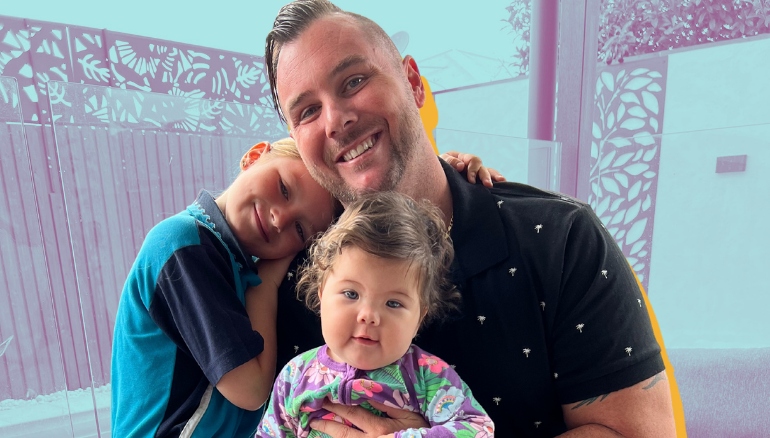
The perception of it has been challenging. You still get the occasional raised eyebrow — Jamie
Delilah, 7, Mataya Jade, 9 months.
I always wanted to have kids since I was a very, very young age. It’s fun, it’s exciting, it’s challenging. It’s the most rewarding job I’ve ever done in my life.
My first daughter is from a previous relationship and we look after her part-time — that’s probably the biggest reason why I chose to take parental leave because I missed so much time with her. We have a very healthy relationship with my partner and my ex-partner. It takes work but we’re extremely lucky, to be honest.
My fiancé and I were trying to conceive for just over a year and a half and that was quite a challenging time. I don’t think we were ever planning on me taking parental leave when we first started trying. The company I work for was always looking for ways to make it a great place to work and pushed for more diversity and equality, especially when it came to parental leave.
If you’re the primary carer you can take three months at full pay, six months at half pay, and 12 months without pay. Firstly, I encouraged my best mate; I was the one who educated him on what it was and what it was about, and he was the first male in the company to take it. From there, a few people took it and I’m the first male in the company to take six months as a primary carer.
My wife had a couple of months off and went back to work running her hairdressing business from home a few days a week, so she’s still really involved with the kids in between clients.
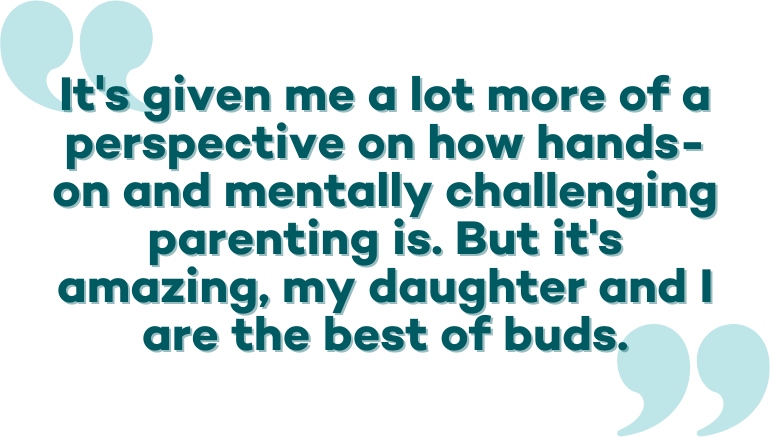
The perception of it has been challenging. You still get the occasional raised eyebrow, “Oh, doesn’t mum want to be home with the baby? Why are you home with the baby? That’s a bit weird.” Some people are still pretty backward about it. That’s been a little bit disappointing to be honest, especially from random people.
But it’s amazing, my daughter and I are the best of buds. A lot of kids rely on their mum to be there 24/7 and they’re comfortable with their mum, they feed with their mum, they sleep with their mum a lot more, but we’re 50-50 we both have a really strong relationship with her. The best part is quality time. Waking up and being the first person you see is the most rewarding thing ever.
I could have missed opportunities at work during this time but what’s more important — chasing that extra dollar or spending time at home with my daughters? It gives me a whole different perspective on life and what I value most. Time’s the only thing that we can’t get back or buy.
References
[1] Cools S, Fiva JH, Kirkebøen LJ. (2015) Causal effects of paternity leave on children and parents. Scand J Econ.
[2] Norman, H., Elliot, M., and Fagan, C., (2018), “Does Fathers’ Involvement in Childcare and Housework Affect Couples’ Relationship Stability?” Social Science Quarterly 99.5: 1599–1613.
[3] Australian Bureau of Statistics (2017), One in 20 dads take primary parental leave, viewed 27 May 2019, <https://www.abs.gov.au/ausstats/abs@.nsf/Lookup/by%20Subject/4125.0~Sep% 202017~Media%20Release~One%20in%2020%20dads%20take%20primary%20parental% 20l eave%20(Media%20Release)~11>.
[4] Australian Human Rights Commission (HRC). (2014). Supporting working parents: Pregnancy and return to work national review. Sydney: HRC. Retrieved from www.humanrights.gov.au/sites/default/fi les/document/ publication/SWP_Report_2014.pdf







